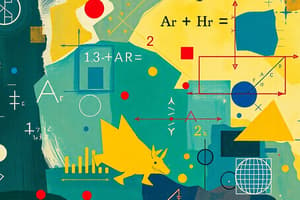Podcast
Questions and Answers
Which of the following properties is exhibited by both addition and multiplication of real numbers?
Which of the following properties is exhibited by both addition and multiplication of real numbers?
- Associative Property (correct)
- Commutative Property (correct)
- Identity Property
- Distributive Property
Which of the following statements is NOT true about irrational numbers?
Which of the following statements is NOT true about irrational numbers?
- They cannot be expressed as a fraction of two integers.
- They can be expressed as the square root of a perfect square. (correct)
- They are a subset of real numbers.
- They are always non-terminating and non-repeating decimals.
Which of the following mathematical concepts is NOT directly involved in the analysis of continuous change and motion?
Which of the following mathematical concepts is NOT directly involved in the analysis of continuous change and motion?
- Integrals
- Derivatives
- Limits
- Probability (correct)
The set of all possible outputs of a function is called its:
The set of all possible outputs of a function is called its:
Consider the following sets: A = {1, 2, 3, 4}, B = {3, 4, 5, 6}, and C = {1, 3, 5, 7}. What is the result of (A ∩ B) ∪ C?
Consider the following sets: A = {1, 2, 3, 4}, B = {3, 4, 5, 6}, and C = {1, 3, 5, 7}. What is the result of (A ∩ B) ∪ C?
Which of the following mathematical concepts is used to model the spread of a disease in a population?
Which of the following mathematical concepts is used to model the spread of a disease in a population?
What is the difference between statistics and probability?
What is the difference between statistics and probability?
What is the value of the derivative of $f(x) = x^2 - 3x + 2$ at the point x = 2?
What is the value of the derivative of $f(x) = x^2 - 3x + 2$ at the point x = 2?
Flashcards
Arithmetic
Arithmetic
Basic operations on numbers: addition, subtraction, multiplication, division.
Algebra
Algebra
Uses variables to represent unknowns, focuses on equations and inequalities.
Geometry
Geometry
Studies shapes, sizes, and positions of figures in space.
Calculus
Calculus
Signup and view all the flashcards
Types of Numbers
Types of Numbers
Signup and view all the flashcards
Sets
Sets
Signup and view all the flashcards
Functions
Functions
Signup and view all the flashcards
Probability and Statistics
Probability and Statistics
Signup and view all the flashcards
Study Notes
Fundamental Concepts in Mathematics
- Mathematics encompasses a wide range of topics, including arithmetic, algebra, geometry, calculus, and more. It's a fundamental language for understanding patterns, relationships, and quantities in the world.
Arithmetic
- Arithmetic deals with basic operations on numbers: addition, subtraction, multiplication, and division.
- It forms the foundation for more complex mathematical concepts.
- Properties of numbers (commutative, associative, distributive) are integral to arithmetic operations.
Algebra
- Algebra extends arithmetic by using variables to represent unknown quantities.
- It focuses on equations and inequalities, providing methods to solve for unknowns.
- Key algebraic techniques include factoring, simplifying expressions, and solving equations.
Geometry
- Geometry studies shapes, sizes, and positions of figures in space.
- It encompasses various geometric figures like points, lines, angles, triangles, polygons, and circles.
- Principles of geometry are used in architecture, engineering, and design.
Calculus
- Calculus deals with continuous change and motion.
- It involves concepts like limits, derivatives, and integrals.
- Applications of calculus include optimization problems, modeling physical phenomena, and analyzing rates of change.
Types of Numbers
- Natural numbers (counting numbers): 1, 2, 3,...
- Whole numbers: 0, 1, 2, 3,...
- Integers:..., -3, -2, -1, 0, 1, 2, 3,...
- Rational numbers: numbers that can be expressed as a fraction p/q, where p and q are integers and q is not zero.
- Irrational numbers: numbers that cannot be expressed as a fraction of two integers. Examples include π and √2.
- Real numbers: the set of all rational and irrational numbers.
- Complex numbers: numbers of the form a + bi, where a and b are real numbers and i is the imaginary unit (i² = -1).
Sets
- Sets are collections of objects.
- Operations on sets include union, intersection, and complement.
- Set notation and Venn diagrams are used to represent and analyze sets.
Functions
- Functions describe relationships between inputs and outputs.
- A function assigns a single output to each input.
- Different types of functions include linear, quadratic, exponential, trigonometric, and logarithmic functions.
Probability and Statistics
- Probability deals with the likelihood of events.
- Statistics involves collecting, organizing, analyzing, and interpreting data.
- Both topics are crucial in many fields, including data science and research.
Logic and Proof
- Logic provides a framework for reasoning and argumentation.
- Mathematical proofs use logical steps to demonstrate the truth of statements.
- Abstract reasoning is a key skill in mathematics.
Measurement
- Various units are used for measurement, including standard units like meters, kilograms, seconds.
- Understanding different scales of measurement (nominal, ordinal, interval, ratio) is important in data analysis.
Problem Solving
- Problem-solving is a central skill in mathematics.
- Successful problem-solving involves identifying the problem, devising a plan, implementing the plan, and evaluating the results.
- Many mathematical strategies can be helpful for problem-solving.
Studying That Suits You
Use AI to generate personalized quizzes and flashcards to suit your learning preferences.




